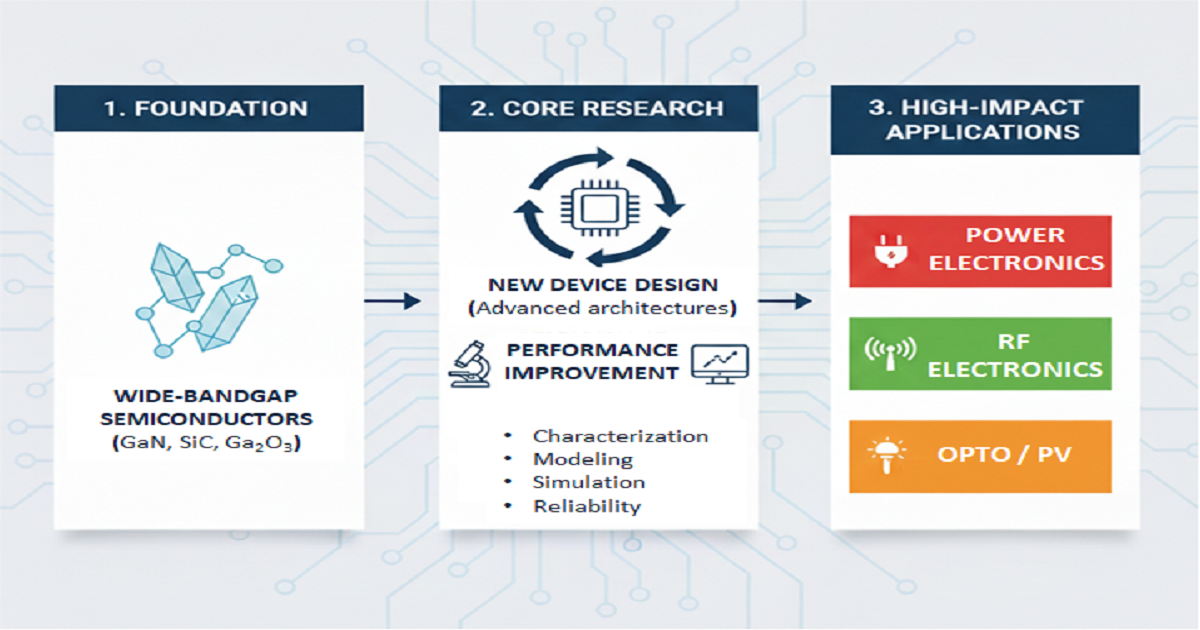- 2.5Impact Factor
- 5.5CiteScore
- 20 daysTime to First Decision
Advanced Semiconductor Device Design and Performance Improvement
Special Issue Information
Dear Colleagues,
Wide-bandgap (WBG) semiconductor materials have emerged as a fundamental element of modern electronics, particularly for applications that require high efficiency, durability, and performance. Unlike traditional silicon-based devices, which are limited by their relatively narrow bandgap, WBG materials such as gallium nitride, silicon carbide, gallium oxide, and more offer significant advantages in power, radiofrequency (RF), and optoelectronic applications due to their superior thermal conductivity, higher breakdown voltage, faster switching capabilities, and tunable bandgap.
In this Special Issue, we accept papers on the development of new device designs, validated by experimental measurements, device and defect characterization confirming performance improvements, and numerical simulations validating experimental results.
Additional papers not covered in this definition but related to wide-bandgap devices can be considered for publication.
Dr. Carlo De Santi
Dr. Isabella Rossetto
Dr. Manuel Fregolent
Guest Editors
Manuscript Submission Information
Manuscripts should be submitted online at www.mdpi.com by registering and logging in to this website. Once you are registered, click here to go to the submission form. Manuscripts can be submitted until the deadline. All submissions that pass pre-check are peer-reviewed. Accepted papers will be published continuously in the journal (as soon as accepted) and will be listed together on the special issue website. Research articles, review articles as well as short communications are invited. For planned papers, a title and short abstract (about 250 words) can be sent to the Editorial Office for assessment.
Submitted manuscripts should not have been published previously, nor be under consideration for publication elsewhere (except conference proceedings papers). All manuscripts are thoroughly refereed through a single-blind peer-review process. A guide for authors and other relevant information for submission of manuscripts is available on the Instructions for Authors page. Applied Sciences is an international peer-reviewed open access semimonthly journal published by MDPI.
Please visit the Instructions for Authors page before submitting a manuscript. The Article Processing Charge (APC) for publication in this open access journal is 2400 CHF (Swiss Francs). Submitted papers should be well formatted and use good English. Authors may use MDPI's English editing service prior to publication or during author revisions.
Keywords
- gallium nitride
- silicon carbide
- gallium oxide
- wide-bandgap semiconductors
- power electronics
- RF electronics
- optoelectronics

Benefits of Publishing in a Special Issue
- Ease of navigation: Grouping papers by topic helps scholars navigate broad scope journals more efficiently.
- Greater discoverability: Special Issues support the reach and impact of scientific research. Articles in Special Issues are more discoverable and cited more frequently.
- Expansion of research network: Special Issues facilitate connections among authors, fostering scientific collaborations.
- External promotion: Articles in Special Issues are often promoted through the journal's social media, increasing their visibility.
- e-Book format: Special Issues with more than 10 articles can be published as dedicated e-books, ensuring wide and rapid dissemination.

